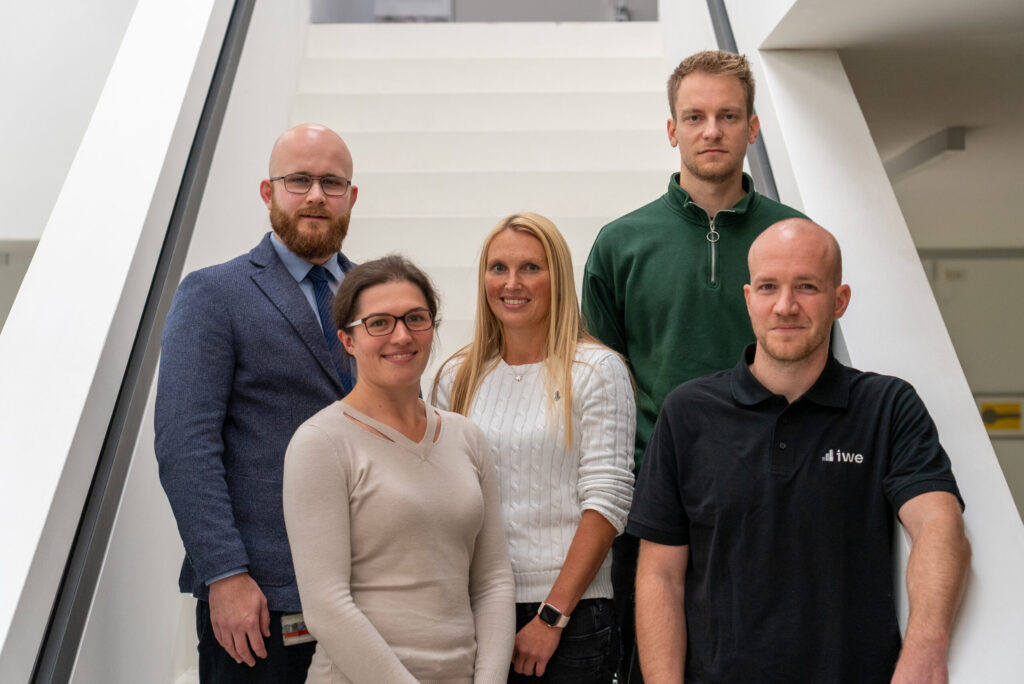The 4th colloquium of the research institutes ibp, ifm, inwa, iisys and iwe once again impressively demonstrated the breadth of research at Hof University of Applied Sciences. The colloquium is organised once a year to enable the institutes to exchange ideas on projects and research activities. The aim is to uncover opportunities for co-operation and support scientific networking at the university.

Dr Natascha Kuhl (ibp), Thomas Hühnel (ifm) and Oliver Stark (iwe); Image: Hof University of Applied Sciences;
Once again, project posters and short descriptions of current research activities were submitted to all institutes in the run-up to the event. In the course of a voting process, the speakers were then selected who had the opportunity to present their work at the event. The major theme of sustainability emerged as the unifying element of all presentations.
The following projects were presented:
- ibp - Dr Natascha Kuhl: "BioSlide":
The aim of the project is to develop a 100% sustainable sliding surface for plant and mechanical engineering as well as for the ski, snowboard and water sports sector. Natural and biodegradable plastics and additives such as carbon black, minerals and natural waxes are to be used during processing. The biodegradability property in particular is intended to combat the problem of environmental pollution caused by the microplastics produced by abrasion. The focus of product development is on the sliding properties, long-term stability, a long service life and heat resistance of 80-120 degrees Celsius. In addition to the Institute for Applied Biopolymer Research, the project partner Creative Plastic Solutions (CPS) GmbH is also working on this topic.
- ifm - Thomas Hühnel: "TERA X":
Thomas Hühnel's work at the Münchberg campus focusses on the technical radial weaving of solid wood structures. He would like to use solid wood braids as an integral part of architecture and construction, among other things. In order to experiment with this, he has a large radial braiding facility in Münchberg at his disposal, in which a maximum of 48×4 threads can be braided around a core. Willow wood is particularly suitable for weaving, as it is flexible and grows back quickly.
- inwa - Lena Bächer: "EduLirion":
This is about the food of the future in the form of sustainable food production. Lena Bächer is focussing on the soilless cultivation of plants in the field of aeroponics. The plants are nourished solely by nutrient-rich water, which is available to the plant roots in the form of water mist. Corresponding research is being carried out with the sweet clover plant. As part of the research project, a public science approach was chosen that also involves primary school children in the project.
- iisys - Marc Lehmann: "KLIPS":
The aim of the project, which is funded by the Federal Ministry for Digital and Transport Affairs (BMDV) as part of the "mFUND" technology programme, is to localise and simulate heat islands for innovative urban and transport planning. The aim is to bundle heterogeneous data in an AI-based information platform in such a way that the formation of heat islands can be systematically recorded and possible structural and planning countermeasures can be initiated. - iwe - Oliver Stark: "Concept for an energy self-sufficient Hof University of Applied Sciences":
Oliver Stark is looking into the question of how the Hof campus could become energy self-sufficient. This endeavour is driven not least by various legal requirements from the state and federal government. Colleges and universities are supposed to be climate-neutral by 2040. Collecting the necessary data is proving to be no easy task at Hof University of Applied Sciences. On the way to becoming a climate-neutral university, the effects of various measures such as reducing the university's energy consumption by up to 30 % and the use of photovoltaic modules on the buildings through to roofing the car park with photovoltaics are being investigated.

The presentations were followed by a cosy get-together with food and drinks in the foyer of the Iisys. The next colloquium will take place in 2024 under the auspices of inwa.
Background Institute Colloquium:
The Hof University of Applied Sciences Institute Colloquium was initiated by ibb for the first time in 2020. Until 2020, there was an annual institute barbecue for the purpose of exchange between the institutes, where all institutes of Hof University of Applied Sciences came together to spend a few pleasant hours together. In order to prevent research projects from relying solely on the expertise of one's own research institute and to utilise possible synergies, today's institute colloquium was finally launched.







